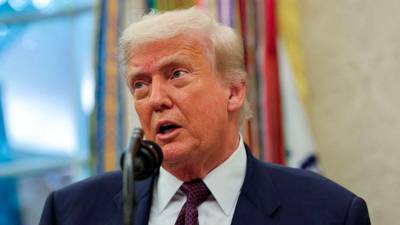WASHINGTON: U.S. President Donald Trump signed an executive order on Thursday that aims to allow private equity, real estate, cryptocurrency, and other alternative assets in 401(k) retirement accounts.
The order smoothes the way for private equity and other fund managers to tap into trillions of dollars of Americans’ retirement savings. It could open up a vast new funding source to managers of alternative assets outside of stocks, bonds, and cash, though critics say it also could bring too much risk into retirement investments.
“The Securities and Exchange Commission must consider ways to facilitate access to alternative asset investments by participants in defined-contribution retirement plans,“ a summary of the order released by the White House said.
It directs the Labor Secretary to consult with her counterparts at the Treasury Department, the SEC, and other federal regulators, and to “re-examine” previous guidance.
Such a move could be a boon for big alternative asset managers such as Blackstone, KKR, and Apollo Global Management by opening the $12-trillion market for retirement funds, known as defined contribution plans, to their investments. Some of those firms have already struck partnerships with asset managers who run those plans.
The world’s largest asset manager, BlackRock, plans to launch its own retirement fund that includes private equity and private credit assets next year.
Proponents argue that younger savers can benefit from potentially higher returns on riskier investments in funds that get more conservative as they approach retirement.
“On the asset manager side, it’s a $12-trillion retirement market that they have previously not had access to. For them, there’s certainly a lot of opportunity,“ said Morningstar analyst Jason Kephart.
“From the individual investor standpoint, though, that’s where it’s less clear after all the additional fees, the additional complexity, and less transparency,“ Kephart added.
The new investment options carry lower disclosure requirements and are generally less easy to sell quickly for cash than the publicly traded stocks and bonds that most retirement funds rely on. Investing in them also tends to carry higher fees.
In defined contribution plans, employees make contributions to their own retirement account, frequently with a matching contribution from their employer. The invested funds belong to the employee, but unlike a defined benefit pension plan, there is no guaranteed regular payout upon retirement.
RISKS AND REWARDS
Many private equity firms are hungry for the new source of cash that retail investors could offer after three years in which high interest rates shook their time-honored model of buying companies and selling them at a profit.
Whatever results may come from Trump’s order, it likely will not happen overnight, private equity executives say. Plaintiffs’ lawyers are already preparing for lawsuits that could be filed by investors who do not understand the complexity of the new forms of investments.
BlackRock CEO Larry Fink acknowledged in a recent call with analysts that the change posed challenges for asset managers.
“The reality is, though, there is a lot of litigation risk. There’s a lot of issues related to the defined contribution business,“ Fink said. “And this is why the analytics and data are going to be so imperative way beyond just the inclusion.”
CFO Martin Small said the industry may seek litigation reform before it can expand into the market.
Any easing of access to volatile assets such as cryptocurrencies to be included in 401(k)s would be Trump’s latest embrace of digital assets, and could be a potential boon for the sector, including asset managers that operate crypto exchange-traded funds, such as BlackRock and Fidelity.
“Bitcoin has moved beyond its early days as a merely speculative asset and is slowly entering into many investors’ long-term investment strategy,“ said Gerry O’Shea, head of global market insights at Hashdex Asset Management. “This EO will help accelerate this trend.”
The Department of Labor issued guidance during Trump’s previous presidency on how such plans could invest in private equity funds within certain limits, but few took advantage, fearing litigation.
Proponents argue that younger savers can benefit from potentially higher returns on riskier investments in funds that get more conservative as they approach retirement.
Democratic Senator Elizabeth Warren wrote in June to the chief executive of annuity provider Empower Retirement, which oversees $1.8 trillion in assets for more than 19 million investors, asking how retirement savings placed in private investments could be safeguarded “given the sector’s weak investor protections, its lack of transparency, expensive management fees, and unsubstantiated claims of high returns.” – Reuters
